Effect of Service Quality, Price and CSR on Customer Satisfaction
Investigate the effects of CSR, Service Quality and Price on customer satisfaction in the context of Surf Shack and IT Solutions.
27 Pages7666 Words251 Views
Added on 2023-06-11
About This Document
This research report analyzes the impact of service quality, price and corporate social responsibility (CSR) on customer satisfaction in Surf Shack & IT Solutions. The report identifies the role of service quality, CSR and price in achieving customer satisfaction and recommends ways to improve them.
Effect of Service Quality, Price and CSR on Customer Satisfaction
Investigate the effects of CSR, Service Quality and Price on customer satisfaction in the context of Surf Shack and IT Solutions.
Added on 2023-06-11
ShareRelated Documents
THE EFFECT OF SERVICE QUALITY, PRICE AND CORPORATE SOCIAL RESPONSIBILITY ON CUSTOMER
SATISFACTION
ABSTRACT
The effects of corporate social responsibility (CSR), Service Quality and Price on customer satisfaction in
the case study Surf Shack and IT Solutions. The CSR is one of the major pillars in the modern ethics,
environmental, community, and workplace. It's a major contribution in the customer satisfaction. The
research project report is based on four research objectives which include: to identify the role of service
quality and the price in customer satisfaction, to determine the role of CSR in the success of the firm, to
evaluate the effectiveness of the service quality and the price which are used by Surf Shack, to
recommend the ways to improve the service quality and the price-related issues for increasing the
customer satisfaction, in the case study of Surf Shack. Stratified sampling technique was used to collect
primary data from 100 customers of Surf Shack & IT Solutions. The respondent was 34 giving a response
rate of 34%. Data were analyzed using SPSS Software. It is based on descriptive and cross-sectional
design analysis. The price had the highest effect on the customer satisfaction of 75.8%, followed by the
service quality and finally the CSR. The three dependent variables proved to be significant.
SATISFACTION
ABSTRACT
The effects of corporate social responsibility (CSR), Service Quality and Price on customer satisfaction in
the case study Surf Shack and IT Solutions. The CSR is one of the major pillars in the modern ethics,
environmental, community, and workplace. It's a major contribution in the customer satisfaction. The
research project report is based on four research objectives which include: to identify the role of service
quality and the price in customer satisfaction, to determine the role of CSR in the success of the firm, to
evaluate the effectiveness of the service quality and the price which are used by Surf Shack, to
recommend the ways to improve the service quality and the price-related issues for increasing the
customer satisfaction, in the case study of Surf Shack. Stratified sampling technique was used to collect
primary data from 100 customers of Surf Shack & IT Solutions. The respondent was 34 giving a response
rate of 34%. Data were analyzed using SPSS Software. It is based on descriptive and cross-sectional
design analysis. The price had the highest effect on the customer satisfaction of 75.8%, followed by the
service quality and finally the CSR. The three dependent variables proved to be significant.
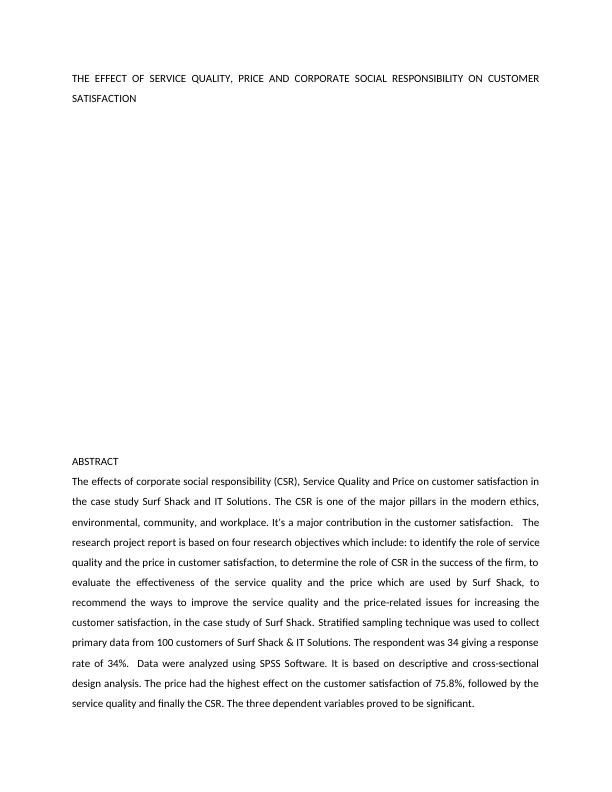
INTRODUCTION
Customer satisfaction is key factor to retain a customer and grow any business. So, every firm is dealing
in the market to fulfill the customer demand and offer optimum satisfaction. Increasing level of
customer satisfaction enhances the brand loyalty of the firm (Gera, et al., 2017). For any organization to
operate successfully, it must establish itself and the environment in which it is operating. The
environment forces could be either is internal multifaceted or external environment which contributes
to the environment complex. Therefore, all the environmental factors must be anticipated, monitored,
assessed and incorporated in top-level decision making. This research is based on customer satisfaction
and has supported to offer the understanding regarding the importance of corporate social
responsibility, service quality and price in the context of achieving the customer satisfaction.
This research is based on the customer satisfaction at the Surf Shack & IT solutions firm. It is an NZ based
firm which deals in Auckland. This firm was launched in the year 2016. Due to increasing level of the
competition, it is essential for the firm to give concern towards customer satisfaction as no business can
survive in the industry without customer satisfaction (Blut, et al., 2015). Furthermore, this research will
also supportive to show right direction to improve the company sales, performance and get competitive
advantage and success in the industry.
Problem Statement
In the current scenario, competition is increasing which is creating the issue for the firm to get success
and to perform well in the market as well (Saeidi, et al., 2015). At the same time, the IT sector is facing
tough competition in NZ. This is due to the continuous change in technology. So, to sustain in a
competitive market, it is essential for Surf Shack to utilize effective strategy to create its market image
and long-term sustainability in the industry. In this scenario, it is analyzed that giving concern towards
sustainable practices support the firm to create competitive advantage in the industry. This research
report reveals the role of service quality, CSR, and price used by Surf Shack to increase customer
satisfaction.
Purpose of the study
The purpose of the research report is to establish the effect of CSR, service quality and price in customer
satisfaction and recommending the ways which can be used by Surf Shack to improve the level of
customer satisfaction.
Objectives of the study
The research objectives of this study are as follow:
To identify the role of service quality and the price in customer satisfaction.
Customer satisfaction is key factor to retain a customer and grow any business. So, every firm is dealing
in the market to fulfill the customer demand and offer optimum satisfaction. Increasing level of
customer satisfaction enhances the brand loyalty of the firm (Gera, et al., 2017). For any organization to
operate successfully, it must establish itself and the environment in which it is operating. The
environment forces could be either is internal multifaceted or external environment which contributes
to the environment complex. Therefore, all the environmental factors must be anticipated, monitored,
assessed and incorporated in top-level decision making. This research is based on customer satisfaction
and has supported to offer the understanding regarding the importance of corporate social
responsibility, service quality and price in the context of achieving the customer satisfaction.
This research is based on the customer satisfaction at the Surf Shack & IT solutions firm. It is an NZ based
firm which deals in Auckland. This firm was launched in the year 2016. Due to increasing level of the
competition, it is essential for the firm to give concern towards customer satisfaction as no business can
survive in the industry without customer satisfaction (Blut, et al., 2015). Furthermore, this research will
also supportive to show right direction to improve the company sales, performance and get competitive
advantage and success in the industry.
Problem Statement
In the current scenario, competition is increasing which is creating the issue for the firm to get success
and to perform well in the market as well (Saeidi, et al., 2015). At the same time, the IT sector is facing
tough competition in NZ. This is due to the continuous change in technology. So, to sustain in a
competitive market, it is essential for Surf Shack to utilize effective strategy to create its market image
and long-term sustainability in the industry. In this scenario, it is analyzed that giving concern towards
sustainable practices support the firm to create competitive advantage in the industry. This research
report reveals the role of service quality, CSR, and price used by Surf Shack to increase customer
satisfaction.
Purpose of the study
The purpose of the research report is to establish the effect of CSR, service quality and price in customer
satisfaction and recommending the ways which can be used by Surf Shack to improve the level of
customer satisfaction.
Objectives of the study
The research objectives of this study are as follow:
To identify the role of service quality and the price in customer satisfaction.
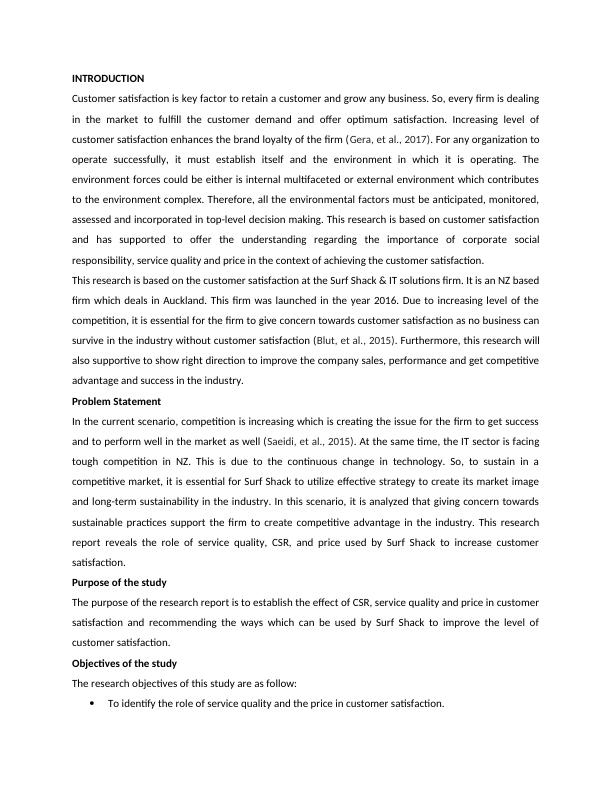
To determine the role of CSR in the success of the firm.
To evaluate the effectiveness of the service quality and the price which are used by Surf
Shack?
To recommend the ways to improve the service quality and the price-related issues for
increasing the customer satisfaction, case study of Surf Shack.
Hypothesis
H1: There is a positive relationship between service quality and customer satisfaction.
H2: There is a positive relationship between CSR and customer satisfaction.
H3: There is a positive relationship between price and customer satisfaction.
Research questions
The research questions of this study are as follow:
What is the importance of CSR in achieving customer satisfaction in Surf Shack & IT Solutions?
What is the importance of Service Quality in achieving customer satisfaction in Surf Shack & IT
Solutions?
What is the importance of Price in achieving customer satisfaction in Surf Shack & IT Solutions?
What are the ways to improve the service quality of Surf Shack & IT Solutions?
Limitations of the study
There are shortcomings that were encountered in the study some of which were as follows; the
respondents were not willing to give information about the performance which they felt should be
treated with a lot of confidentiality. Some respondents didn't have the time and commitment to fill the
questionnaire.
Assumptions
Some assumptions were expected in this study included: the chosen data collection instrument was
valid and measured the desired constructs; the respondent answered questions correctly, truthfully and
within the expected time.
THEORETICAL FRAMEWORK
Independent Variable Dependent Variable
CUSTOMER
CSR H1
To evaluate the effectiveness of the service quality and the price which are used by Surf
Shack?
To recommend the ways to improve the service quality and the price-related issues for
increasing the customer satisfaction, case study of Surf Shack.
Hypothesis
H1: There is a positive relationship between service quality and customer satisfaction.
H2: There is a positive relationship between CSR and customer satisfaction.
H3: There is a positive relationship between price and customer satisfaction.
Research questions
The research questions of this study are as follow:
What is the importance of CSR in achieving customer satisfaction in Surf Shack & IT Solutions?
What is the importance of Service Quality in achieving customer satisfaction in Surf Shack & IT
Solutions?
What is the importance of Price in achieving customer satisfaction in Surf Shack & IT Solutions?
What are the ways to improve the service quality of Surf Shack & IT Solutions?
Limitations of the study
There are shortcomings that were encountered in the study some of which were as follows; the
respondents were not willing to give information about the performance which they felt should be
treated with a lot of confidentiality. Some respondents didn't have the time and commitment to fill the
questionnaire.
Assumptions
Some assumptions were expected in this study included: the chosen data collection instrument was
valid and measured the desired constructs; the respondent answered questions correctly, truthfully and
within the expected time.
THEORETICAL FRAMEWORK
Independent Variable Dependent Variable
CUSTOMER
CSR H1
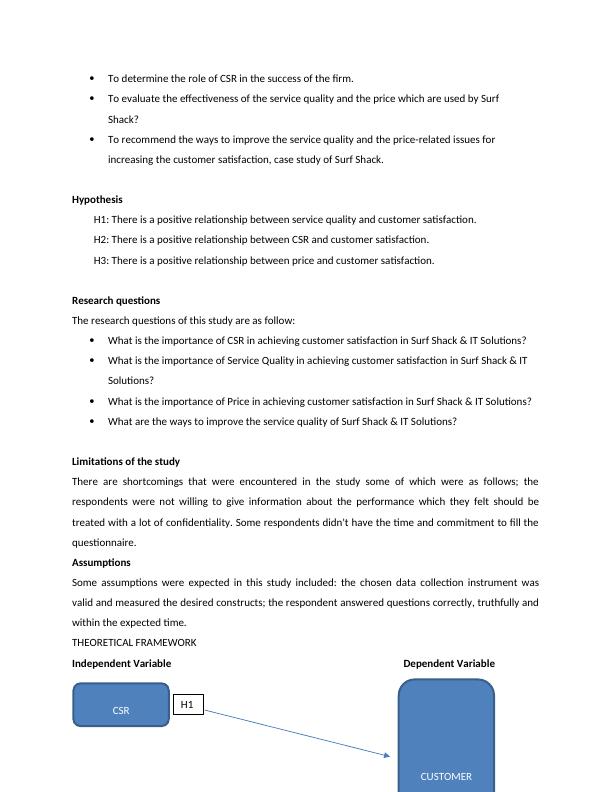
Figure 1: Theoretical framework for this study
LITERATURE REVIEW
In this section, secondary research methods are used to discuss the research objectives. For this
purpose, the data from journals, articles, research papers and reports are used, that increases the
reliability of the study.
Service Quality
Service quality is an element of competitiveness, which establishes and sustains the satisfying
relationships between businesses and customers. According to Wang and Wang, (2006), service quality
is an attitude, which is related to satisfaction which is achieved when performance matches the
expectation. Parasuraman et al. (1985), defines service quality as a difference between expectation [E]
and performance [p] in terms of service. He describes service quality as a function of pre-purchase
customer expectations, perceived process and output quality (Felix, 2017).
Dimensions of Service Quality
• Tangibility: Tangibility constitutes of the equipment, physical facilities and appearance of the business
(Parasuraman et al., 1988:35- 43);
• Reliability: Reliability is the ability that the promised service will be performed dependably and
accurately (Parasuraman et al., 1988:35- 43);
• Responsiveness: Responsiveness is the willingness to offer prompt service and assistance to the
customers (Parasuraman et al., 1988:35- 43);
• Assurance: Assurance determines the knowledge and courteousness of the employees as well as their
aptitude to stimulate trust and confidence (Parasuraman et al., 1988:35- 43);
• Empathy: Empathy is the individualized attention and care provided to customers (Parasuraman et al.,
1988:35- 43).
Price
Customers consider price as an indicator for evaluating the experience they have had with a product or
a service, which then influences their attitude for the product or that service provider (Bolton & Lemon,
1999; Varki & Colgate, 2001). Zeithaml (1988), defines price as “what is given up or sacrificed to obtain a
SERVICE
QUALITY H2
PRICE H3
LITERATURE REVIEW
In this section, secondary research methods are used to discuss the research objectives. For this
purpose, the data from journals, articles, research papers and reports are used, that increases the
reliability of the study.
Service Quality
Service quality is an element of competitiveness, which establishes and sustains the satisfying
relationships between businesses and customers. According to Wang and Wang, (2006), service quality
is an attitude, which is related to satisfaction which is achieved when performance matches the
expectation. Parasuraman et al. (1985), defines service quality as a difference between expectation [E]
and performance [p] in terms of service. He describes service quality as a function of pre-purchase
customer expectations, perceived process and output quality (Felix, 2017).
Dimensions of Service Quality
• Tangibility: Tangibility constitutes of the equipment, physical facilities and appearance of the business
(Parasuraman et al., 1988:35- 43);
• Reliability: Reliability is the ability that the promised service will be performed dependably and
accurately (Parasuraman et al., 1988:35- 43);
• Responsiveness: Responsiveness is the willingness to offer prompt service and assistance to the
customers (Parasuraman et al., 1988:35- 43);
• Assurance: Assurance determines the knowledge and courteousness of the employees as well as their
aptitude to stimulate trust and confidence (Parasuraman et al., 1988:35- 43);
• Empathy: Empathy is the individualized attention and care provided to customers (Parasuraman et al.,
1988:35- 43).
Price
Customers consider price as an indicator for evaluating the experience they have had with a product or
a service, which then influences their attitude for the product or that service provider (Bolton & Lemon,
1999; Varki & Colgate, 2001). Zeithaml (1988), defines price as “what is given up or sacrificed to obtain a
SERVICE
QUALITY H2
PRICE H3
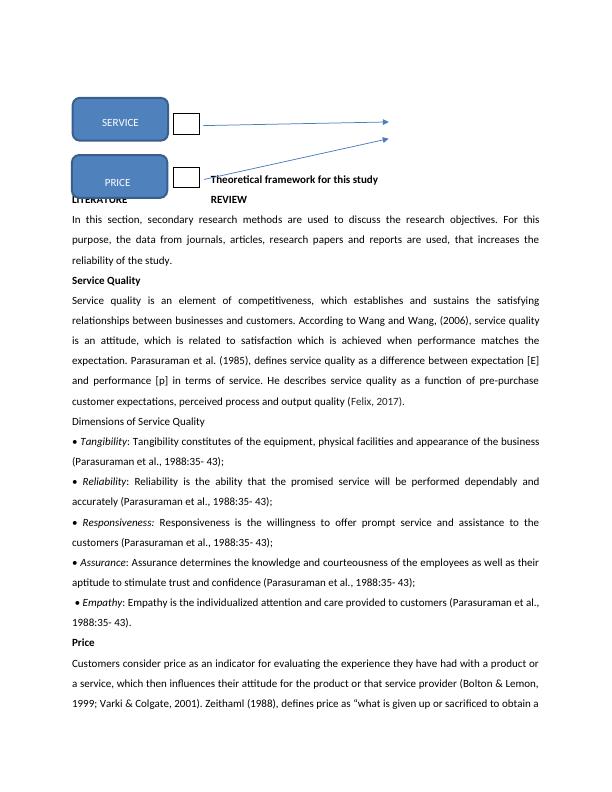
product. He further adds that customers may not remember the real price of the product or service, but
they generally encode or correlate the price in some ways so that it has some meaning to them ( Han &
Ryu, 2009). Also, as the consumers are price sensitive and prefer to buy quality products at a low price.
Due to this reason, increased price of the product decreases the competitive advantage. However, on
the contrary, Chernev & Blair (2015) determined that at present, due to increasing trend of globalization
and industrialization, climatic change, natural disasters and other natural calamities are increasing. This
has increased the concern of the consumers towards eco-friendly practices and they even show
readiness to pay more for the product or services which allows increasing the chances of sustainability
(Di & Kostovetsky, 2014).
Corporate Social Responsibility (CSR)
CSR can be defined as the social responsibility of businesses which incorporates the legal, ethical and
economic prospects. It is the commitment of companies towards the benefits of society to reduce usage
of any harmful contents and emphasize the usage of long-run beneficial products for society (Irshad,
et.al, 2017). Companies are taking positive steps towards adapting CSR in their business as it has a
positive impact on customer buying behaviors. Many scholars have suggested that organizations can
earn remarkable benefits when they are recognized by customers as being socially responsible
(Ho. ,2017). A business which integrates social and economic factors in its practices try to minimize the
usage of products which pollute the environment in anyway (noise, air or earth pollution).
Customer Satisfaction
Customer satisfaction is a term that is used in business to measure that the products or services of the
firm become able to meet the customer expectation. In the competitive marketplace, businesses are
competing for customers as they are the basic element of market strategy. From the research of L ins, et
al., (2017), it is determined that consumers play a major role for the firm to get the success in the
market and to achieve all objectives effectively. Satisfied customers are the key to long-term business
success. Companies with highly satisfied customers get higher economic revenue (Felix, 2017).
However, Customer satisfaction is considered as measures of post consumption of services or products.
Effect of Service Quality, CSR and Price on Customer Satisfaction
In the current scenario, due to increase in the level of literacy level and liberalization, consumers give
special consideration towards service quality, price as well as the Corporate Social Responsibility of a
business.
they generally encode or correlate the price in some ways so that it has some meaning to them ( Han &
Ryu, 2009). Also, as the consumers are price sensitive and prefer to buy quality products at a low price.
Due to this reason, increased price of the product decreases the competitive advantage. However, on
the contrary, Chernev & Blair (2015) determined that at present, due to increasing trend of globalization
and industrialization, climatic change, natural disasters and other natural calamities are increasing. This
has increased the concern of the consumers towards eco-friendly practices and they even show
readiness to pay more for the product or services which allows increasing the chances of sustainability
(Di & Kostovetsky, 2014).
Corporate Social Responsibility (CSR)
CSR can be defined as the social responsibility of businesses which incorporates the legal, ethical and
economic prospects. It is the commitment of companies towards the benefits of society to reduce usage
of any harmful contents and emphasize the usage of long-run beneficial products for society (Irshad,
et.al, 2017). Companies are taking positive steps towards adapting CSR in their business as it has a
positive impact on customer buying behaviors. Many scholars have suggested that organizations can
earn remarkable benefits when they are recognized by customers as being socially responsible
(Ho. ,2017). A business which integrates social and economic factors in its practices try to minimize the
usage of products which pollute the environment in anyway (noise, air or earth pollution).
Customer Satisfaction
Customer satisfaction is a term that is used in business to measure that the products or services of the
firm become able to meet the customer expectation. In the competitive marketplace, businesses are
competing for customers as they are the basic element of market strategy. From the research of L ins, et
al., (2017), it is determined that consumers play a major role for the firm to get the success in the
market and to achieve all objectives effectively. Satisfied customers are the key to long-term business
success. Companies with highly satisfied customers get higher economic revenue (Felix, 2017).
However, Customer satisfaction is considered as measures of post consumption of services or products.
Effect of Service Quality, CSR and Price on Customer Satisfaction
In the current scenario, due to increase in the level of literacy level and liberalization, consumers give
special consideration towards service quality, price as well as the Corporate Social Responsibility of a
business.
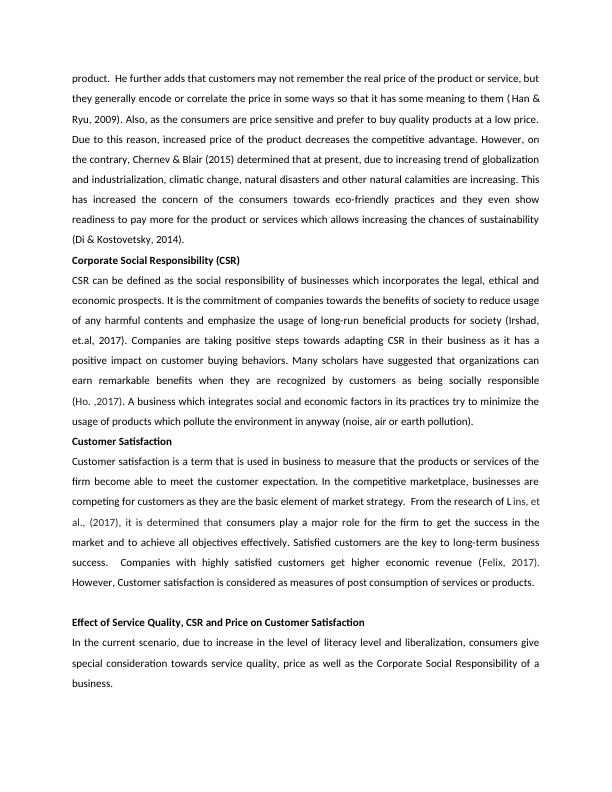
It is thus, essential for the firm to give concern towards improving their CSR, service quality along with
providing competitive prices to attract the consumers. In this context, Saeidi, et al., (2015) states that
according to triple bottom line framework, while dealing in the industry, a firm needs to give concern
towards 3Ps, that is, people, planet, and profit. Giving concern towards all these parameters support the
firm to increase the interest of the stakeholders. It also allows the firm to fulfill its responsibility towards
the society. In support of this, Korschun, et al. (2014) determined that today's consumers prefer to buy
the product which is eco-friendly and is designed on the basis of green practices. In the views of
Sengupta, et al., (2015), consumers prefer high-quality service at a fair price as it allows the consumers
to avail the company services at a reasonable price.
Wang, et al., (2016) depicted that the firms which do its branding on the basis of better service quality
and the effective price, get more consumer attention. Today’s consumers not only give concern towards
price parameters but also give concern towards quality as well as sustainable practices. Furthermore,
Dhaliwal, et al., (2014) stated that in the context of gadgets, instead of availing the services of repairing,
consumers prefer to change the product and to buy the new one as it supports to buy the new gadget
with advanced features. At the same time, repairing cost is also high, so consumers prefer to add some
extra money and to buy a new gadget. However, utilization of the strategy of branding the product on
the basis of utilizing the tagline of eco-friendly practices will support the firm to draw the attention of
the consumers. Moreover, it will support to increase the trend of reuse the product by repairing it
instead of just throwing it and buying the new product.
Utilization of this strategy remains supportive for the firm to attract the stakeholders’ attention
(Christensen, et al., 2014). It will allow increasing the interest of the stakeholders which supports the
firm to increase the availability of the fund and further allows expanding the business into the global
market. The use of better pricing strategy also supportive to eliminate the situation of a legal hindrance
while allowing the firm to create a positive brand image.
At the same time, it is essential for the firm to give concern towards offering quality services at a
reasonable price. It allows the organization to achieve the consumer trust and loyalty which supports to
create long-term sustainability in the industry (Orel, & Kara, 2014). On the other hand, Kumar (2016)
determined that consumers are the major stakeholder of any firm so firm needs to design effective
strategies to offer quality product and services at an affordable price. It remains supportive to fulfill the
ethical standards towards the consumers.
RESEARCH METHODOLOGY
Research design
providing competitive prices to attract the consumers. In this context, Saeidi, et al., (2015) states that
according to triple bottom line framework, while dealing in the industry, a firm needs to give concern
towards 3Ps, that is, people, planet, and profit. Giving concern towards all these parameters support the
firm to increase the interest of the stakeholders. It also allows the firm to fulfill its responsibility towards
the society. In support of this, Korschun, et al. (2014) determined that today's consumers prefer to buy
the product which is eco-friendly and is designed on the basis of green practices. In the views of
Sengupta, et al., (2015), consumers prefer high-quality service at a fair price as it allows the consumers
to avail the company services at a reasonable price.
Wang, et al., (2016) depicted that the firms which do its branding on the basis of better service quality
and the effective price, get more consumer attention. Today’s consumers not only give concern towards
price parameters but also give concern towards quality as well as sustainable practices. Furthermore,
Dhaliwal, et al., (2014) stated that in the context of gadgets, instead of availing the services of repairing,
consumers prefer to change the product and to buy the new one as it supports to buy the new gadget
with advanced features. At the same time, repairing cost is also high, so consumers prefer to add some
extra money and to buy a new gadget. However, utilization of the strategy of branding the product on
the basis of utilizing the tagline of eco-friendly practices will support the firm to draw the attention of
the consumers. Moreover, it will support to increase the trend of reuse the product by repairing it
instead of just throwing it and buying the new product.
Utilization of this strategy remains supportive for the firm to attract the stakeholders’ attention
(Christensen, et al., 2014). It will allow increasing the interest of the stakeholders which supports the
firm to increase the availability of the fund and further allows expanding the business into the global
market. The use of better pricing strategy also supportive to eliminate the situation of a legal hindrance
while allowing the firm to create a positive brand image.
At the same time, it is essential for the firm to give concern towards offering quality services at a
reasonable price. It allows the organization to achieve the consumer trust and loyalty which supports to
create long-term sustainability in the industry (Orel, & Kara, 2014). On the other hand, Kumar (2016)
determined that consumers are the major stakeholder of any firm so firm needs to design effective
strategies to offer quality product and services at an affordable price. It remains supportive to fulfill the
ethical standards towards the consumers.
RESEARCH METHODOLOGY
Research design
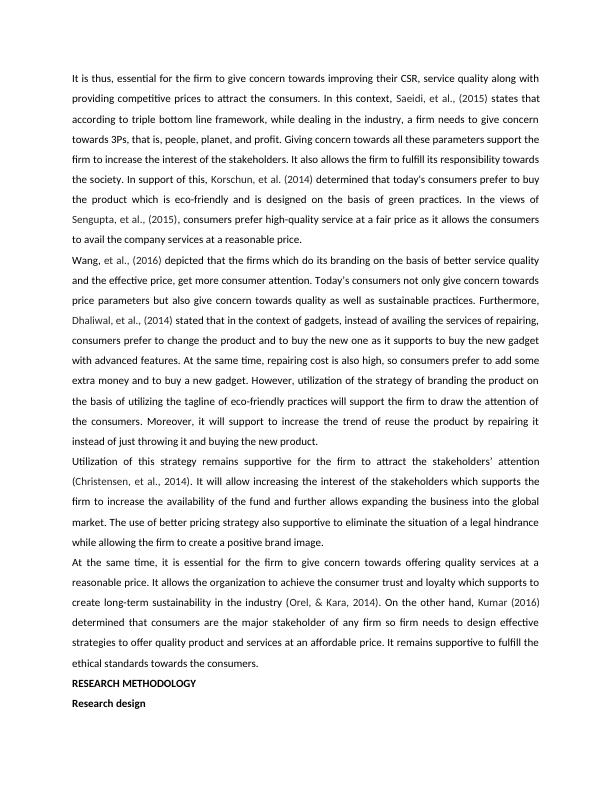
End of preview
Want to access all the pages? Upload your documents or become a member.
Related Documents
MIS713 Supply Chain Management and Logisticslg...
|21
|3925
|178
Impact of Corporate Social Responsibility on Organization's Performancelg...
|33
|8780
|370
Managing Successful Project Management (Corporate Social Responsibility) A Case Study on Selfridge's Retail Chainlg...
|25
|5760
|123
Implementation of Corporate Social Responsibilitylg...
|32
|5707
|210
Corporate Social Responsibility and Its Impact on Customer Loyaltylg...
|46
|13856
|419
Corporate Social Responsibilitylg...
|13
|793
|53
